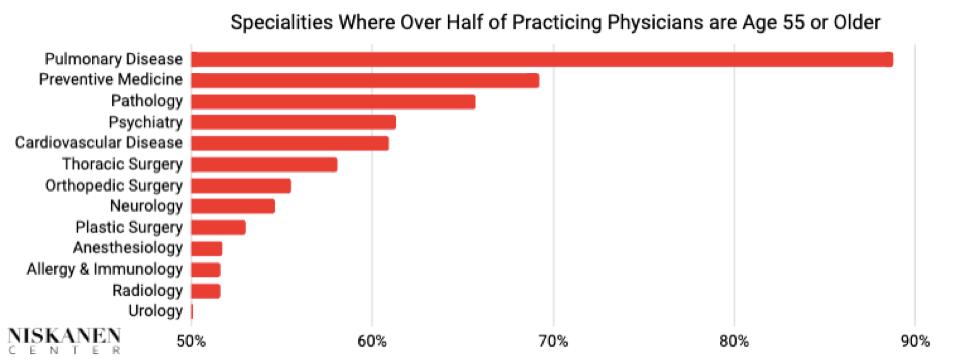According to a recent report by the Association of American Colleges (AAMC), America is facing an increasing shortage of doctors, with physician demand set to exceed supply by between 46,900-121,900 by 2032. A major driver of this phenomenon is the nation’s growing senior population. Ten-thousand more Americans reach the age of 65 every day — a trend projected to continue throughout most of the next decade.
A massive portion of this shortage (estimated to range between 21,100-55,200) will be in primary care fields, including: geriatrics, pediatrics, internal medicine, and family medicine. The graph below depicts AAMC calculations of the percentage change in first-year medical residents and fellows in primary care from 2012-2017. Although growth in all fields is lagging behind demand, the 14 percent decline of residents and fellows in geriatric medicine is especially alarming, given the specific need for doctors trained in eldercare.

Another 24,800-65,800 fewer doctors will be in specialist fields–in part, because many are reaching retirement age. By the next decade, two in five physicians will be 65 or older.
The numbers for specific medical specialities are equally bleak. Nearly 89 percent of practicing pulmonologists (lung doctors) are approaching retirement age, along with over 65 percent of pathologists, and 60 percent of cardiologists.

This impending wave of physician retirements is putting Americans at risk. Lung and heart diseases remain two of the leading causes of death in the United States, and will only worsen as the senior population grows. Furthermore, the opioid epidemic is exacerbating a major shortage of forensic pathologists needed to perform autopsies related to drug overdoses and other tragic deaths.
A Bill to Welcome More Foreign Doctors
A bipartisan Senate bill re-introduced last March, however, can provide some relief. The Conrad State 30 and Physician Access Reauthorization Act spearheaded by Senators Amy Klobuchar (D-MN), Susan Collins (R-ME), and Jacky Rosen (D-NV) would extend and strengthen a program that lets states recruit foreign doctors to fill existing healthcare shortages.
The Conrad 30 program waives a requirement for doctors on the J-1 visa to return to their home country for a minimum of three years after completing their residency. Instead, they can remain in the United States by working in an underserved community for three years.
Although the Conrad 30 program was set to expire this year, this bill would extend it to 2021 and modify it in several key ways:
1. Adjusting the number of available physician slots per state.
The legislation grants states five additional physician slots every year that their use reaches 90 percent of the national number available. States that use fewer than five slots are excluded from the calculation to prevent their less active programs from impeding the expansion of others. Extra slots can also be removed if use in the previous year falls by five percent or more. If the per state slot limit reaches 45, the program will continue to expand only if 95 percent of slots are used.
2. Streamlining the green card process
Under current law, foreign doctors can apply for a green card through the National Interest Waiver if they spend five or more years practicing in an underserved area or in a Veterans Affairs facility. Of those five years, three years can include time required under Conrad 30. This legislation would exempt these physicians from the worldwide green card caps, which has contributed to a 119-year backlog for some eligible physicians.
3. Allowing dual-intent
In most cases, petitioners of temporary visas can be denied if they intend on using the visa as a stepping stone towards permanent residence. This legislation would protect physicians from having their J-1 petition denied simply because they intend to remain in the country after they complete their medical training.
4. Strengthening employment protections
Finally, the legislation mandates that if a state denies a physician a Conrad 30 waiver due to all of their slots being filled, the physician is allowed a six-month extension to find employment in another state. Furthermore, physicians’ whose employment is terminated before completing their three-year work requirement have a 120-day window to find another employer.
Employer contracts with physicians must also specify the locations and maximum number of on-call hours the physician must work, as well as the amount of malpractice insurance they are providing, and prohibit employers from including non-compete provisions in their contracts.
Recommendations to Further Improve the Program
Although the changes proposed in this bill will improve the Conrad 30 program’s ability to alleviate healthcare shortages, there is room for even more improvement.
First, Congress should change how physician slots are allotted so that they are tailored to the individual needs and varying demands of each state. Although this legislation creates conditions that trigger the expansion of the number of available waivers, it’s possible that the combined demand from states won’t meet the bill’s threshold–even if over half of them reached their per state waiver limit.
Congress should also standardize criteria for when a location qualifies as a “Medically Underserved Area” or “Medically Underserved Population,” as states use different standards for applying these terms. Databases should also be regularly updated to reflect when areas are no longer in need of new physicians.
Lawmakers should also think of ways to increase local involvement with participating physicians to ensure that their professional and personal needs are being met. A major reason why some states have trouble attracting and retaining physicians has to do with the difficulties that some of them face integrating into the local community. Furthermore, overstretched state healthcare officials often lack the capacity to maintain sufficient relationships with physicians, contributing to lower retention.
The healthcare shortage will only become more pressing as time passes. As such, Congress should make the program permanent, rather than requiring reauthorization every several years. The Conrad State 30 and Physician Access Reauthorization Act is a much needed step in the right direction and should be a vital part of any comprehensive solution that addresses America’s healthcare needs.